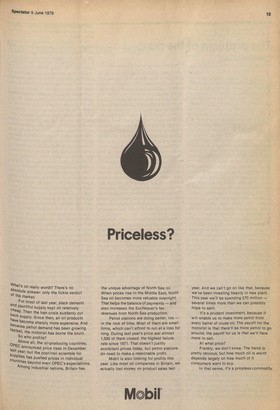Priceless?
What's oil really worth? There's no absolute answer: only the fickle verdict Of the market.
For most of last year, slack demand and Plentiful supply kept oil relatively cheap. Then the Iran crisis suddenly cut back supply. Since then, all oil products have become sharply more expensive. And because petrol demand has been growing fastest, the motorist has borne the brunt.
So who profits?
Above all, the oil-producing countries. OPEC announced price rises in December last year; but the post-Iran scramble for supplies has pushed prices in individual countries beyond even OPEC's expectations.
Among industrial nations, Britain has the unique advantage of North Sea oil. When prices rise in the Middle East, North Sea oil becomes more valuable overnight. That helps the balance of payments — and also increases the Exchequer's tax revenues from North Sea production.
Petrol stations are doing better, too — in the nick of time. Most of them are small firms, which can't afford to run at a loss for long. During last year's price war almost 1,500 of them closed: the highest failure rate since 1971. That doesn't justify exorbitant prices today, but petrol stations do need to make a reasonable profit.
Mobil is also looking for profits this year. Like most oil companies in Britain, we actually lost money on product sales last year. And we can't go on like that, because we've been investing heavily in new plant. This year we'll be spending £70 million — several times more than we can possibly hope to earn.
It's a prudent investment, because it will enable us to make more petrol from every barrel of crude oil. The payoff for the motorist is that there'll be more petrol to go around; the payoff for us is that we'll have more to sell.
At what price?
Frankly, we don't know. The trend is pretty obvious; but how much oil is worth depends largely on how much of it consumers want to buy.
In that sense, it's a priceless commodity.










































 Previous page
Previous page